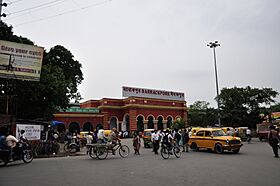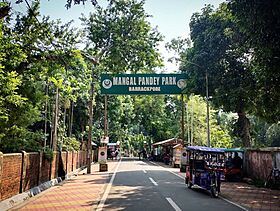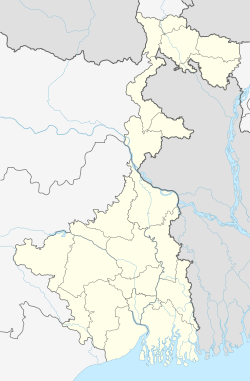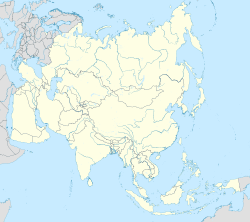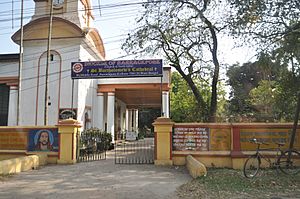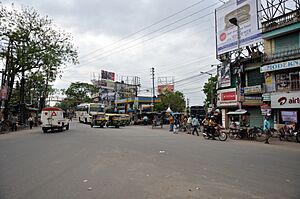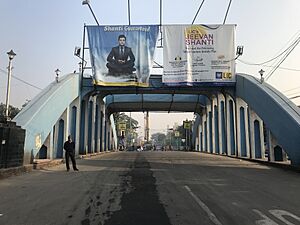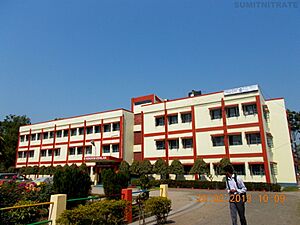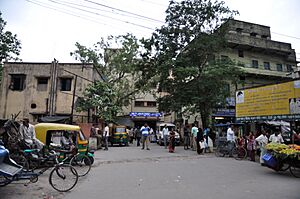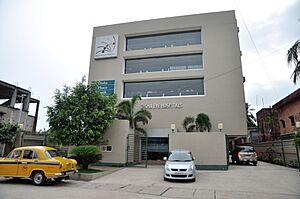Barrackpore facts for kids
Quick facts for kids
Barrackpore
Barrackpur
|
|
|---|---|
|
City
|
|
|
From the top :
Barrackpore railway station Barrackpore Trunk Road Race course Track Ground Mangal Pandey Park |
|
| Country | |
| State | |
| District | North 24 Parganas |
| Region | Greater Kolkata |
| Government | |
| • Type | Municipality |
| • Body | Barrackpore Municipality |
| Area | |
| • Total | 10.61 km2 (4.10 sq mi) |
| Elevation | 15 m (49 ft) |
| Population
(2011)
|
|
| • Total | 152,784 |
| • Density | 14,400/km2 (37,296/sq mi) |
| Demonym(s) | Barrakpurians |
| Languages | |
| • Official | Bengali |
| • Additional official | English |
| Time zone | UTC+5:30 (IST) |
| PIN |
700120, 700121, 700122, 700123
|
| Telephone code | +91 33 |
| Vehicle registration | WB-23/WB-24 |
| Lok Sabha constituency | Barrackpore |
| Vidhan Sabha constituency | Barrackpore |
| Police Jurisdiction | Barrackpore Police Commissionerate |
Barrackpore (also known as Barrackpur) is a city and a municipality. It is located just north of Kolkata in the North 24 Parganas district of West Bengal, India. This area is part of the Kolkata Metropolitan Development Authority (KMDA). Barrackpore is also the main administrative center for the Barrackpore subdivision.
Contents
History of Barrackpore
What's in a Name?
The name Barrackpore might come from the English word "barracks." This is because it was the first place where the British East India Company built military barracks in India. Another idea is that the name comes from "Barbakpur," which is mentioned in an old book called Ain-i-Akbari.
Early Days and British Rule
Ancient Greek writers from long ago mentioned the Barrackpore area. They called the people living there the Gangaridai. By the 15th and 16th centuries, towns like Chanak (part of Barrackpore) were busy river towns. Old records show that many towns along the Hooghly river, including Barrackpore, were important trading spots.
Under the Mughal Empire, Bengal was divided into areas called Circars. Barrackpore was known as "Barbuckpur" in those days. From the 1600s, local rulers called Zamindars governed the area.
The first British military camp, or cantonment, in India was built here in 1772. Later, the British built a large Government House and estate. This was a country home for the viceroy, about 15 km outside Calcutta.
Rebellions and Mangal Pandey
Barrackpore was important during two major rebellions against British rule.
The first was the Barrackpore Mutiny of 1824. Indian soldiers, called sepoys, refused to travel by sea to fight in Burma. This was because of a social belief called "kala pani," which meant crossing the ocean was forbidden. The British stopped this rebellion.
In 1857, another important event happened in Barrackpore. An Indian soldier named Mangal Pandey attacked his British commander. He was later punished. His army unit was disbanded, which made many other sepoys angry. This event is seen by some as a spark that helped start the wider Indian Rebellion of 1857. A park called 'Sahid Mangal Pandey Udyan' was opened by the Hooghly river to remember his actions.
Asia's First Zoo
Did you know that Asia's first zoo was set up in Barrackpore? Lord Wellesley built this zoo in the 19th century. It even had a beautiful aviary (a large birdcage) built in a Gothic style. The zoo had many animals, including African donkeys, tigers, bears, and kangaroos.
Lord Wellesley wanted to learn more about Asian animals. He started the 'National Heritage of India' as a research center. The Barrackpore Zoo was built to keep these animals and birds for study. This zoo was one of the very first open to the public in the world. It opened before the famous London Zoo!
Later, the East India Company didn't have enough money to keep the zoo running. So, the animals were given to the rulers of different Princely states.
Barrackpore Park
Between 1798 and 1805, Lord Wellesley was the Governor of Kolkata. He created a beautiful garden along the Ganges river in Barrackpore. This garden is now called Laat Bagan or Mangal Pandey Park. Next to it, he built a huge house that looked like a castle. This house became known as Barrackpore Government House. He also built a road from Barrackpore to Shyambazar, which is now called B.T. Road.
Geography and Location
Barrackpore is bordered by several other towns. To the north are North Barrackpur and Jaffarpur. To the east are Mohanpur, Chak Kanthalia, Ruiya, and Patulia. Titagarh is to the south. The Hooghly River and Barrackpur Cantonment are to the west.
Most people in the Barrackpore subdivision live in cities and towns. In 2011, the area had many people living close together. There are 16 municipalities and 24 census towns in the subdivision.
Police and Post Offices
The Barrackpore and Titagarh police stations are part of the Barrackpore Police Commissionerate. They are in charge of the Barrackpore Municipal area.
Barrackpore has several post offices. The main one is Barrackpore Head Post Office. It has the PIN 700120. Other post offices in the area have different PINs, like 700121, 700122, and 700123.
Climate
Barrackpore is known for its clean air. It was ranked as the 30th best "National Clean Air City" in India for cities with 3-10 lakh people.
Population and Languages
Population Growth
Barrackpore has grown a lot over the years. In 1901, about 19,307 people lived here. By 2011, the population had grown to 152,783.
In 2011, there were slightly more males (51%) than females (49%). About 88.76% of the people over 6 years old could read and write. Most of the people in Barrackpore are Bengali and Hindu.
Languages Spoken
The most common language spoken in Barrackpore is Bengali. Other languages like Hindi and Urdu are also spoken by many people.
City Facilities
Barrackpore is a well-developed city. It has a good network of roads and drains. For healthcare, there are many medicine shops and several hospitals. These include the B.N. Bose Subdivisional Hospital and various private hospitals.
The city also has many schools, from primary to senior secondary levels. There are also colleges and research centers. For fun and learning, Barrackpore has community halls, public libraries, and reading rooms. Small businesses and confectionery items are made here. There are also many bank branches.
Getting Around Barrackpore
Roads
The Barrackpore Trunk Road (B.T. Road) is a major road. It connects Barrackpore Chiria More to Shyambazar. Ghoshpara Road links the railway station area to Kanchrapara. Surendranath Banerjee Road also connects different parts of the city. The Barrackpore-Barasat Road goes from Lalkuthi to Barasat. Many buses use these roads. A new bridge, the Barrackpore Rail Overbridge, was opened in 2013 to make travel easier.
Buses
Many bus routes connect Barrackpore to other places. Some buses go to Esplanade and Howrah Station. Others connect to nearby towns like Barasat, Kanchrapara, and Naihati. There are also longer routes to places like Digha and Durgapur.
Railways
Barrackpore has had train service since 1862. You can reach Barrackpore railway station from Sealdah Station in about 35-40 minutes. The Sealdah-Ranaghat Line runs through the city. It connects Barrackpore to many other towns and cities. The Barrackpore Racecourse railway station was built in 1927 for special race trains. Today, the Indian army uses this station.
Ferries
There are three ferry points in Barrackpore. These ferries cross the Hooghly River. They connect Barrackpore to places like Serampore and Sheoraphuli on the other side of the river.
Air Travel
Barrackpore Air Force Station is an Indian Air Force base. It's one of the oldest air stations in India. It mainly handles transport planes. The closest major airport for public travel is Netaji Subhash Chandra Bose International Airport. It is located in Dum Dum, Kolkata.
Education
Barrackpore has many good schools. Some well-known ones include St. Augustine's Day School, Douglas Memorial Higher Secondary School, Barrackpore Government High School, and Army Public School.
For higher education, there are colleges like Barrackpore Rastraguru Surendranath College. There are also engineering colleges, such as St. Mary's Technical Campus Kolkata. The Central Research Institute for Jute and Allied Fibers is also located here. It is the only research institute in India focused on jute and similar crops.
Healthcare
Barrackpore has several medical facilities. The B.N. Bose Subdivisional Hospital is a large public hospital. There are also hospitals run by the Barrackpore Cantonment and the Police. Many private hospitals and nursing homes are available too. These include Barrackpore Multispeciality Hospital and Disha Eye Hospitals.
Famous People from Barrackpore
- Mangal Pandey - A brave Indian soldier known for his role in the 1857 rebellion.
- Surendranath Banerjee - An important leader during India's freedom struggle.
- M. J. Akbar - A well-known journalist and politician.
- Ritwick Chakraborty - A popular actor.
See also
 In Spanish: Barrackpore para niños
In Spanish: Barrackpore para niños
 | Delilah Pierce |
 | Gordon Parks |
 | Augusta Savage |
 | Charles Ethan Porter |


